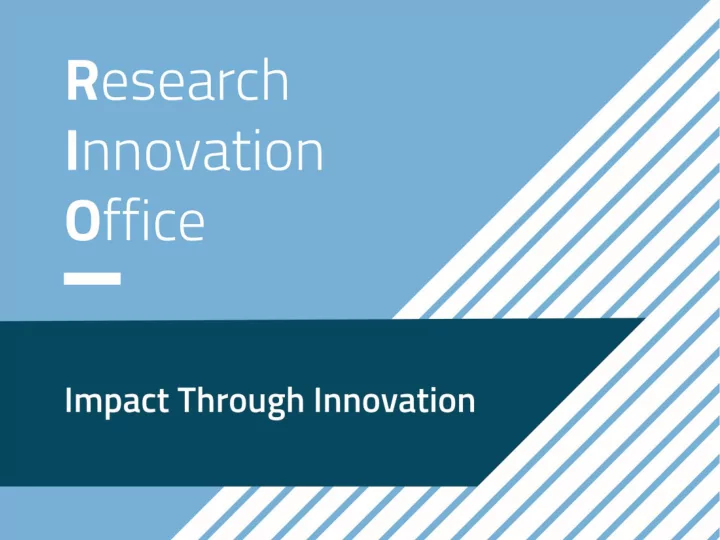

Research Councils UK • Arts and Humanities Research Council (AHRC) • Engineering and Physical Sciences Research Council (EPSRC) • Economic and Social Research Council (ESRC) • Natural Environment Research Council (NERC) • 2017 – Merger of Innovate UK with the research council bodies (UKRI) • Launch of the Industrial Strategy Challenge Fund - £1 billion to work with the indigenous business community • New RCUK invest ~£4 billion/year • 80% of fEC (usually) • applications through Je-S
Trusts & Charities • Leverhulme Trust – support available across academic disciplines including the arts, humanities, science and social sciences • Wellcome Trust – biomedical research and the medical humanities in the pursuit of achieving improvements in human and animal health • Royal Society – supports the UK scientific community and foster collaboration between Uk based and overseas scientists
Engineering and Physical Sciences Research Council (EPSRC) – mathematics; – chemistry; – physics; – materials science; – engineering; – computer science, including high performance computing; – energy research; – research into the built environment; – information and communications technology; – research into innovative manufacturing. – https://www.epsrc.ac.uk/funding/
Main Awards EPSRC • New Investigator Grant ( Replaced First Grant ) • https://www.epsrc.ac.uk/funding/applicationprocess/routes /newac/new-investigator-award/ • Fellowships • https://epsrc.ukri.org/skills/fellows/ • - Post Doc , Early Career, Established Career
FELLOWSHIPS • https://epsrc.ukri.org/skills/fellows/peerreviewprocess/who canapply/ • Engineering Early: April / June / August / October / December / February Early: August / October / December / February / April / June • Physical Sciences Early May / End of September / End of December Early September / End of January / End of April • Mathematical Sciences Early February / End of July Early June / End of November • ICT End of February / End of September Early July / End of January (of the following year)
How to apply EPSRC website to register and access documents https://epsrc.ukri.org/funding/applicationprocess/fundingg uide/ Documentation must be completed as described – EPSRC are very precise on their requirements and non compliant applications are thrown out ie: if it says Arial 10 text must be Arial 10 !! JeS registration used for all calls, add RIO RIM as for editing purposes 100% fEC funding but usually 80% cost to funder Add to Worktribe for costing and usual process for School to sign off
Leverhulme Trust Funding across all disciplines including substantial grants for researchers and fellowships • Distribute approx. £80M per year • Majority of the awards are responsive mode (choice of topic and the design of the research left with applicants) • No set strategic priorities • Primary aim is to fund original research that advances knowledge of our world and ourselves • Funding decisions based on quality, significance & originality • https://www.leverhulme.ac.uk/funding/grant-funding
About the Leverhulme Trust • The Trust supports high quality scholarship, based on an excellent project which is clearly expressed and has sound methodology • The Trust Board makes the funding decisions. It comprises 11 private sector business executives (former members of Unilever senior management) who have experience of identifying potential and quality. They rely on expert peer review to inform their decisions and require clear, jargon free proposals • The Trust has a distinctive and keen appetite for higher-risk research proposals, thus a large proportion of its awards support basic (fundamental or ‘blue - skies’) and cross -disciplinary (or multi- disciplinary) projects • The Trust dislikes claims to scholarship, quality or significance, which are measured purely in terms of metrics, impact, or institutional standing
Leverhulme Trust: funding criteria Originality — the research achieves more than the incremental • development of a single discipline Importance — the work will enable further research or enquiry • Significance — the proposed research has relevance outside a single • field, and is able to excite those working in other disciplines Merit — the quality of the research design and methodology, and the • suitability of the researchers and institution for the realisation of the proposed research objectives
Leverhulme Trust: funding criteria A second set of criteria reflect the particular values of the Leverhulme Trust, and express the Trust Board’s aspiration that funding maintains a distinctive role within the current research funding landscape. They particularly welcome applications that: • Reflect an individual’s personal vision, aspiration, or intellectual curiosity • Take appropriate risks in setting and pursuing research objectives • Enable a refreshing departure from established patterns of working – either for the individual, or for the discipline • Transcend disciplinary boundaries
Main awards Leverhulme • Research Project Grants – up to £500k • Early Career Fellowship – 50% of salary • Research Fellowship – up to £55k • International Academic Fellowship – up to £45k • Major Research Initiatives • https://www.leverhulme.ac.uk/funding/grant-funding
How to apply • Online submission system • Institutional approval part of online system • Read the Frequently Asked Questions • Directly incurred costs only • Some schemes allow teaching replacement costs • Add to Worktribe for costing and usual process for School to sign off
Recommend
More recommend